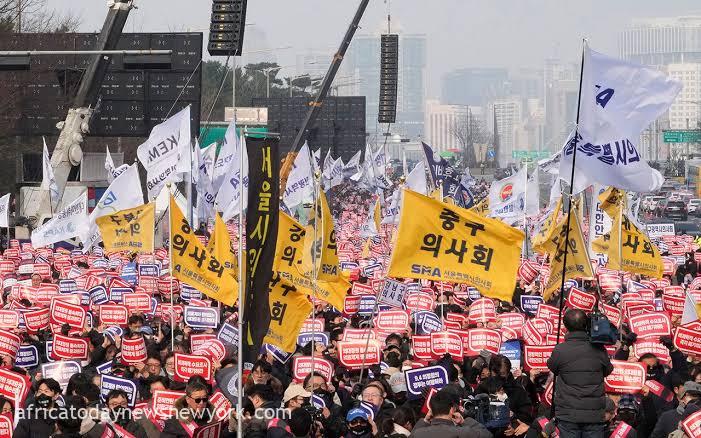South Korea announced on Monday its initiation of procedures aimed at suspending the medical licenses of 4,900 junior doctors who, in protest against government reforms in medical training, have resigned and ceased their work, leading to disruptions in healthcare services.
Since February 20, the ongoing protest originates from government proposals to significantly boost the number of doctors, arguing it as necessary to counteract shortages and serve South Korea’s rapidly aging populace. However, medical professionals assert that this expansion will diminish the quality of healthcare.
In defiance of government orders to return to their hospital posts and the looming legal repercussions, nearly 12,000 junior doctors, constituting 93 percent of the trainee workforce, remained absent. As a result, Seoul has mobilized military medics and allocated millions of dollars from state reserves to alleviate the situation.
The health ministry declared on Monday that it had started dispatching administrative notifications, representing the first stage in the procedure to suspend medical licenses, to thousands of trainee doctors who disobeyed clear orders mandating their return to hospital duties.
“As of March 8 (notifications) have been sent to more than 4,900 trainee doctors,” Chun Byung-wang, director of the health and medical policy division at the health ministry, told reporters.
The government has previously warned striking doctors that they face a three-month suspension of their licences, a punishment it says will delay by at least a year their ability to qualify as specialists.
Chun urged the striking medics to return to their patients.
“The government will take into account the circumstance and protect trainee doctors if they return to work before the administrative measure is complete,” he said, indicating that doctors who come back to work now could avoid the punishment.
“The government will not give up dialogue. The door for dialogue is always open … The government will respect and listen to opinions of the medical community as a companion for the medical reforms,” he added.
Read also: Operations Halted As South Korea Doctors’ Strike Continues
The government last week announced new measures to improve pay and conditions for trainee medics, plus a review of the continuous 36-hour work period, which is a major gripe of junior doctors.
The strikes have led to surgery cancellations, long wait times and delayed treatments at major hospitals.
Contrary to claims of a severe healthcare crisis by some, Seoul refutes the notion, yet Chun revealed plans for military physicians to join civilian healthcare facilities as of this Wednesday.
In a bid to tackle what it deems as one of the lowest doctor-to-population ratios among developed nations, the government is advocating for the admission of an additional 2,000 students to medical schools each year starting from next year.
Amidst apprehensions from doctors regarding the potential deterioration in service quality and medical education, proponents argue that physicians are primarily concerned with safeguarding their salaries and social status.
According to South Korean law, doctors are prohibited from striking, prompting the health ministry to request police investigation into individuals associated with the work stoppage.
Although the plan garners widespread public support, a recent poll conducted by local media revealed that approximately 34 percent of respondents feel that the conflicting parties should engage in more substantive negotiations.
“Doctors and the government are not in a boxing ring,” said an editorial published Monday in the Kyunghyang Shinmun newspaper, urging Seoul and the doctors to resume talks.
It added that people’s patience was wearing thin and emphasized that the exit from the quagmire must be found through dialogue between the two sides.
